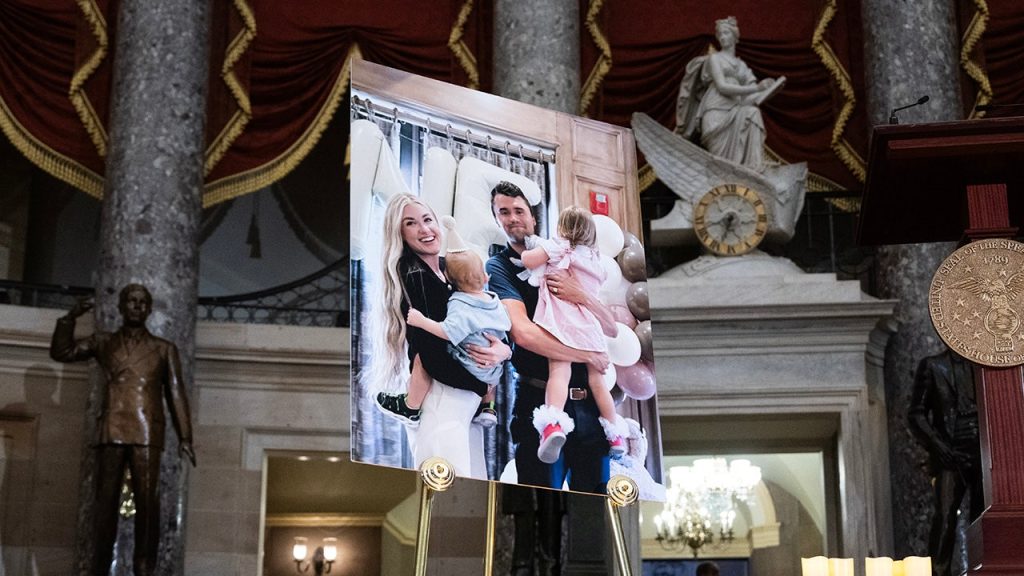A Widow’s Journey: Erika Kirk Reflects on Life After Charlie’s Assassination
In a poignant social media post marking one month since the assassination of her husband Charlie Kirk, co-founder of Turning Point USA, Erika Kirk has opened up about her complex journey through grief. “There is no linear blueprint for grief,” she wrote on Instagram, describing the unpredictable waves of emotion that have characterized her days since the September 10 shooting at Utah Valley University. Her raw honesty reveals the profound contradiction of her experience—moments of complete collapse where she finds herself “crying out the name Jesus in between labored breaths” juxtaposed against unexpected instances of “divinely planted and bittersweet joy” while playing with her children amid family photos. These glimpses into her private suffering have resonated with many who’ve faced similar losses, highlighting the deeply personal yet universal nature of bereavement.
The accompanying video Erika shared offers a bittersweet window into the life they built together. Featuring footage of their family and Charlie’s voice championing marriage and family values, it provides context to the depth of her loss while celebrating the life he lived. The video also captures scenes from Charlie’s memorial service held September 21 at State Farm Stadium in Glendale, Arizona, which drew thousands of mourners. This visual chronicle serves as both tribute and testimony to Charlie’s impact, preserving his voice and vision while documenting the outpouring of support that has surrounded Erika in the aftermath. “I carry my Charlie in every breath, in every ache, and in every quiet act of day-to-day living as I attempt to relearn what that rhythm will be,” she wrote, capturing the challenge of reconstructing daily life in the absence of a spouse.
Perhaps most remarkable about Erika’s public journey has been her stance toward Tyler Robinson, the man accused of killing her husband. In a powerful demonstration of her faith, Erika has expressed forgiveness toward the alleged shooter—a decision that has garnered widespread admiration while also reflecting the Christian principles that anchored her relationship with Charlie. This act of forgiveness stands in stark contrast to the political division that has characterized much of the public response to Charlie Kirk’s death, offering instead a transcendent perspective on tragedy that prioritizes healing over vengeance. Her approach echoes the teachings both she and Charlie embraced, suggesting that even in her darkest hour, she remains committed to the values they shared.
The viral video of Erika weeping over her husband’s casket captured the raw emotion of her loss and humanized what might otherwise have remained a political news story. Charlie and Erika had met in 2018, building a life together that included their two young daughters, making his sudden death all the more devastating for this young family. Now, Erika has stepped into a new role as the leader of Turning Point USA, the conservative nonprofit organization her husband founded. This transition represents both a personal commitment to carrying forward Charlie’s legacy and a professional challenge as she navigates leadership of a prominent political organization while simultaneously processing her grief and caring for their children.
What makes Erika’s reflections particularly compelling is her insight about the relationship between suffering and love. “What I’ve realized through these past 30 days is that the greater the suffering, the purer the love,” she wrote. “And I have never loved him more than I do now.” This profound observation speaks to the paradoxical nature of grief—how the pain of loss can deepen and purify love rather than diminishing it. Her willingness to share such intimate reflections has created space for a different kind of political discourse, one that acknowledges the humanity behind ideological positions and recognizes the universal experiences of love and loss that unite people across the political spectrum.
Erika’s ongoing public mourning process offers a window into the aftermath of political violence that is rarely seen. While assassinations and political attacks are often discussed primarily in terms of their political implications, security failures, or the motivations of perpetrators, Erika’s voice centers the human cost of such violence. Her story reminds us that behind every headline about political conflict lies the potential for profound personal tragedy. As she navigates this uncharted territory—simultaneously grieving her husband, raising their children, leading his organization, and processing her experience in the public eye—Erika Kirk’s journey illustrates both the devastating impact of political violence and the resilience of the human spirit in its aftermath. Her testimony stands as both a personal memoir of loss and a powerful statement about choosing love and forgiveness even in the face of unimaginable tragedy.


